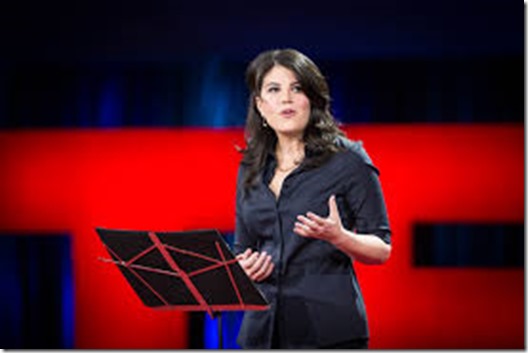Monica Lewinsky's TED Talk: An Important Clarion Call
On Thursday, Monica Lewinsky delivered a much-anticipated TED Talk about her experience as “Patient Zero” in the Internet age of public humiliation.
Her story—and President Clinton’s—dominated the headlines in 1998, threw an administration off-topic for a year, and contributed to the impeachment of a sitting U.S. president. I was eager to hear what she had to say, both from the perspective of American history and her personal narrative.
Ms. Lewinsky proceeded to deliver a gripping 20-minute talk full of poise, integrity, humor, vulnerability, and seriousness of purpose. Although she might have been thrust into the headlines for unfortunate reasons, her reemergence onto the public scene stands to make society better.
Lewinsky discussed her own case, during which she was so low at one point that her parents insisted she shower with the bathroom door open to make sure she didn’t commit suicide. She was compelled to reemerge as a public figure, she says, for a related reason—the 2010 suicide of an 18-year-old Rutgers student whose same-sex kiss was taped and shared online without his knowledge.
“Every day online, people—especially young people who are not developmentally equipped to handle this—are so abused and humiliated that they can’t imagine living to the next day. And some, tragically, don’t.”
Although offline bullying, shaming, and humiliation have been around almost as long as humankind itself, Lewinsky points out that the Internet has changed the scale dramatically.
“Online, technologically enhanced shame is amplified, uncontained, and permanently accessible.”
“Millions of people, often anonymously, can stab you with their words, and that’s a lot of pain.”
“There is a very public price to humiliation, and the growth of the Internet has jacked up that price.”
Lewinsky issued a clarion call to action: Don’t be bystanders to online bullying. Speak out against it, offer compassion to those who are being targeted, and refuse to click on links that lead to the for-profit humiliation of others. As she says in her closing remarks, “Public shaming as blood sport has to stop.”
One thing I hope Ms. Lewinsky addresses in future talks is the question of where the line is between tough but responsible analysis and unnecessary humiliation. At times, that line is easy to spot—those who called her a “tramp,” “slut,” or “whore” should be granted no corner in which to hide from their words. But other parts of the story are trickier.
For example, we can argue about whether The Starr Report, which contained sordid details about their relationship, should have been released publicly. But once it was, didn’t news organizations, which were covering the potential impeachment of a U.S. president, have a responsibility to report on its contents? If so, that would inevitably lead to humiliation for those involved. But I’m not sure such a decision, although uncomfortable, is wrong.
Is the difference between acceptable and unacceptable coverage of a newsworthy figure a matter of tone? If the reporter treats the subject in the limelight as a complete human being rather than a one-dimensional figure, does that mark the difference?
I don’t know the answers to those questions. I suspect Ms. Lewinsky has considered them, and hope she will choose to address to some point.
What do you think? Please leave your thoughts in the comments section below.




I will take some time to watch this video at some point. In the meantime, I will say that I think that all too often the media uses the “don’t we have a responsibility to report it” excuse when it comes to publishing the salacious. It falls into the same category as “the public has a right to know.” The media should never shy away from reporting the controversial; they are as important to our democracy as any branch of government. They keep elected officials honest, and expose the dishonest ones. But I don’t think they do a great job of deciding where to draw the line between that which is factual and that which is prurient. I think that just like most professionals, reporters and editors are ambitious. They chase awards and promotions like most of us. This is perhaps even more true in an era where the corporate overseers of news outlets shed reporters like dead skin. But I’d like to see news outlets stand up to the public the way they try to stand up to the government. Just because we ask for the lurid details doesn’t mean we should get them. I believe it is possible to report the news–and even topple those who are criminal or who behave unethically–while still affording everyone a modicum of dignity. That, in my opinion, is called taking the high road.